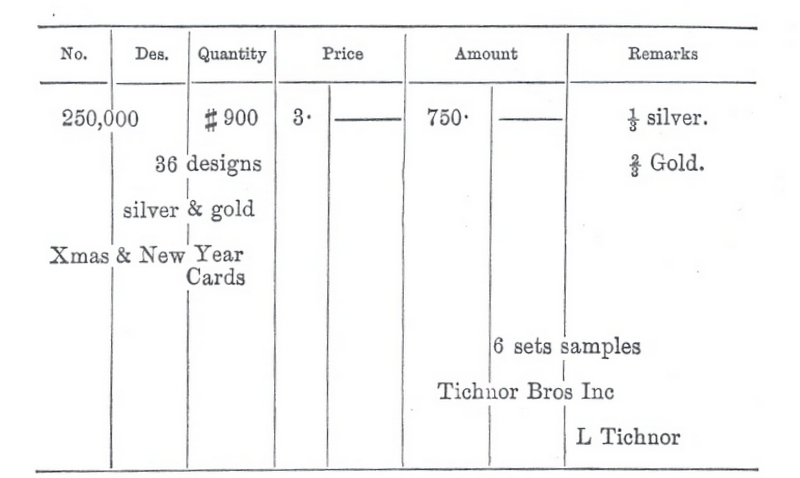 TRADERS COMMERCIAL COMPANY v. TICHNOR BROTHERS, INCORPORATED.
TRADERS COMMERCIAL COMPANY v. TICHNOR BROTHERS, INCORPORATED.
Contract, Construction, In writing. Evidence, Oral affecting writings.
An order in writing, filled in upon an order blank of the seller, for a large number of silver and gold Christmas and New Year post cards, which is dated and is addressed to the seller and is signed by the purchaser, and states the number of cards to be shipped, the descriptive trade number by which they are known and the number of designs, and under the word "Remarks" has the figures and words, "1/3 silver 2/3 gold," and which also states the price per thousand and the total amount to be paid, the terms of payment and the transportation line by which the cards are to be shipped, is not a mere bill of parcels but is a complete contract in writing without ambiguity, which cannot be varied or explained by oral evidence.
CONTRACT , by one trading corporation against another, for the price of two hundred and fifty-nine thousand two hundred post cards alleged to have been purchased by the defendant from Spitzer and Company, the assignors of the plaintiff, under an agreement in writing, which is printed below. Writ dated December 31, 1909.
In the Superior Court the case was tried before Lawton, J. The plaintiff put in evidence an assignment in writing from Spitzer and Company transferring to the plaintiff their claim against the defendant for the price of the post cards sold under the agreement sued upon. That instrument, the execution of which was admitted, was filled in upon an order blank of Spitzer and Company, and was as follows:
Order No 167.............. June 10 1909
Spitzer & Co., Post Cards
12 Waverly Place, New York
Ship to Tichnor Bros Inc
At 44 North Market St
How Ship............ When......................... Boston Mass.
as soon as ready by
Terms: October 1st....................... Metropolitan
60 days 2% ............................ Line
This order is not subject to cancellation.
Page 213

At the close of the evidence the judge ruled as a matter of law that the contract was not ambiguous, and that therefore there was no question for the jury. He ordered a verdict for the plaintiff in the sum of $800.93 which was agreed to by the parties, and no question was made as to the correctness of the amount. The defendant alleged exceptions.
J. P. Magenis, (J. Wentworth with him,) for the defendant.
L. M. Friedman, for the plaintiff.
MORTON, J. The judge ruled that the contract was not ambiguous and that there was nothing for the jury, and directed a verdict for the plaintiff. The amount of the verdict was agreed to by the parties and there is no question as to the correctness of the verdict in that respect. The defendant excepted to the ruling and direction and the exception thus taken presents the only question before us. We think that the ruling and direction were right.
The only particular in respect to which the defendant contends that there is an ambiguity is in regard to the number of designs. It contends that there were to be seventy-two instead of thirty-six, the number that was shipped to them. But it is entirely plain, it seems to us, that the contract is for thirty-six designs and not seventy-two. The words and figures are "36 designs silver and gold. Xmas and New Year Cards," and in the margin, under the head of "Remarks," are the words and figures "1/3 silver 2/3 gold." We do not see how it is possible to
Page 214
construe this as meaning anything except that there were to be thirty-six designs and one third of them were to be in silver and the other two thirds in gold. If there was no ambiguity, then the question of the construction of the contract was plainly for the court. See Strong v. Carver Cotton Gin Co. 197 Mass. 53, 59.
The defendant further contends that the alleged contract is only a bill of parcels, and that therefore the evidence of previous negotiations was competent. In addition to what we have quoted, the writing contains the total number of cards to be shipped, with the descriptive number by which they were known, the price per thousand, and the total amount to be paid, the terms of payment, when and by what line the cards are to be shipped, and the names of the sellers, and is signed by the defendant and dated. We cannot conceive of anything more that would be necessary to constitute a written contract for the purchase and sale of goods.
Exceptions overruled.